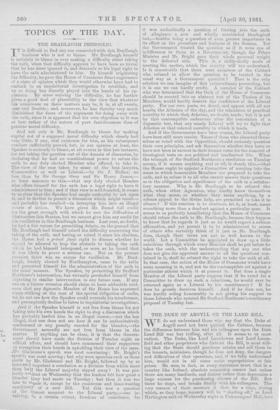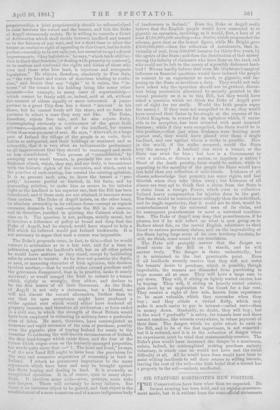THE DUKE OF ARGYLL ON THE LAND BILL.
WE do not understand those who say that the Duke of Argyll need not have quitted the Cabinet, because. the difference between him and his colleagues upon the Irish Land Bill was but trifling, after all. It seems to us most radical. The Duke, like Lord Lansdowne and Lord Lecon- field and other proprietors who distrust the Bill, is most will- ing that the State should purchase estates and sell them to the tenants, minimises, though he does not deny, the dangers and difficulties of that operation, and, if we fully understand' him, would not in all cases resist expropriation at fair- prices. He sees, in fact, as every statesman must, that in a country like Ireland, absolute ownership cannot last unless' there are many landlords, and desires rather than deprecates a large success for the purchasing clauses of the Bill. But there he stops, and breaks finally with his colleagues. The very essence of their measure is that for a time, during which, as they hope, tenancy will be "shading off," as Lord Hartington said on Wednesday night in Fishmongers' Halt, into
proprietorship, a joint proprietorship should be recknowledged to exist between the owner and the tenant, and this the Duke of Argyll strenuously resists. He is willing to concede a Court of Arbitration which shall decide between landlord and tenant as to the fairness of any rent, and for a short time to allow the tenant an exclusive right of appealing to this Court, but he holds perfect ownership to be not only j list, but essential to agi iaultural improvemente. "Any legislation," he says," which tends still fur- ther to limit that freedom [of dealing with property by contract], or to confuse and confound the rights and duties of those who own and those who hire land, is injurious and retrograde legislation," He objects, therefore, absolutely to Free Sale, ae "the very heart and centre of doctrines tending to confu- sion," and denies that any " right " to it exists, the " in- terest " of the tenant in his holding being like many other interests—for example, in many cases of copartnership— which cannot be freely sold, or, indeed, sold at all, without the consent of others equally or more interested. A junior partner in a great City firm has a direct " interest " in his share, but he cannot freely sell his share, and so force his
partners to admit a man they may not like. The Duke, therefore, rejects free sale, and he also rejects fixity, contemplating obviously a continuance of the great Irish grievance,—ejection at the will of the landlord, for causes other than non-payment of rent. He says, "Above all, in a large part of Ireland the tillage of the people is so rude, their habits so antiquated, and their holdings so scattered and BO miserable, that it is very often an indispensable preliminary to all improvement that they should be rearranged and more or less consolidated." This process of "consolidation," by sweeping away small tenants, is precisely the one to which Irishmen object, which, they say, and say truly, is inconsistent with the historic rights of the occupiers, and which, next to the practice of rack-renting, has created the existing agitation. It is to prevent such acts, to leave the tenant a "pro- perty," however partial or limited, in his farm, and by preventing eviction, to make him as secure in his inferior right as the landlord in his superior one, that the Bill has been introduced, and if these ends are not attained, it becomes worse than useless. The Duke of Argyll insists, on the other hand, on absolute ownership in its extreme form—except as regards excessive demands for rent—rejects the Bill in its essence, and is, therefore, justified in quitting the Cabinet which in- sists on it. The question is not, perhaps, strictly moral, but it involves a difference of policy so broad and deep that the Duke of Argyll, had he stayed, would have stayed to help a Bill which he believed would put Ireland backwards. It is not necessary to argue that such a course was impossible.
The Duke's proposals come, in fact, to this,.—that he would consent to arbitration as to a fair rent, and for a time to arbitration against the landlord's will, but on all other points he would leave matters as they stand, except by facilitating sales by owners to tenants. As he does not question the depth, or area, or menacing character of Irish agitation, this decision involves another,—that he would either extend purchase until the grievances disappeared, that is, in practice, make it nearly universal ; or would compel the Irish to submit to a tenure which, rightly or wrongly, they abhor, and declare to be the first source of all their discontent, As the Duke of Argyll is not only a statesman, but a Liberal, we will not discuss the second alternative, further than to say that its open acceptance might have produced a strike against rent which would either have rendered all property insecure, and therefore all civilisation ; or have ended In a civil war, in which the strength of Great Britain would have been employed in collecting by military force a particular Class of debts, He must, therefore, have contemplated an immense and rapid extension of the area of purchase, possibly even the gigantic plan of buying Ireland for resale to the tenants. Considering the well-known circumstances of Ireland, the deep land-hunger which exists there, and the fear of the future which reigns even on the leniently-managed properties, his words quite cover that :—" I. The head and front," he says, "of the new Land Bill ought to have been the provisions for the easy and extensive acquisition of ownership in land in Ireland, I attach no paramount importance to the many Arguments which have been and may be brought against the State buying and dealing in land. It is avowedly an exceptional operation. It is, of course, open to many objec- tions. It involves some evils—even, perhaps, some risks and dangers. There will certainly be many failures. But there is an immense object to be gained, and that object is the establishment of a more numerous and of a more indigenous body of landowners in Ireland." Does the Duke or Argyll really believe that the English people would have consented to so gigantic an operation, involving, as it would, first, a loan of at
least £150,000,000 sterling—the Statist, which propounded the scheme, gave that as the lowest figure, while Mr. Bright gave
±:300,000,000—then the collection of Instalments, that is, virtually of rent, from 500,000 farmers for thirty-five years, by the agents of the State; and, then the distribution of that money among the infinity of claimants who have liens on the land, and who could not be left to the mercy of a possibly dishonest land- lord ? We can hardly believe that even Mr. Gladstone's magical influence on financial questions would have induced the people to consent to an experiment so novel, so gigantic, and im- posing on the State so invidious a duty. They would not only have asked why the operation should not be gradual, discon- tent being meanwhile alleviated by security granted to the tenant precisely as it is in this Bill, but they would have asked a question which we think the Duke of Argyll puts out of sight far too easily, Would the Irish people repay the money ? If they were not compelled to do so, they would have received their farms in fee-simple at the expense of the United Kingdom, in reward for an agitation which, if excus- able in its inception, has been attended with most immoral features ; while if they were compelled, the State would be in this position,—that just when Irishmen were fretting most against rent, they would have placed over them a single landlord, and one against whom a strike is possible. How in the world, if the strike occurred, would the State levy the money ? A landlord can evict a tenant, or the State can evict for him ; but how is a Government to evict a nation, or clistrain a nation, or imprison a nation I Short of the death penalty, force would be useless, while in appealing to the morality of the people the State would have less hold than any collection of individuals. Irishmen of all classes acknowledge that property has some rights, and feel thievish when they take them away ; but Irishmen of all classes are very apt to think that a claim from the State is a claim from a foreign Power, which owes to collective Ireland heavy compensation for injuries done in the past. The State would be resisted more willingly than the individual, and its single superiority, that it could not be shot, would be counterbalanced by the universal area of its claim, and its consequent powerlessness to meet a universal combina- tion. The Duke of Argyll may deny that powerlessness, if he pleases, but if he will reflect on whet is now going on in Radnor about fish, on the rooted English reluctance to shed blood to enforce pecuniary claims, and on the impossibility of the State laying large areas of its own territory desolate, he will, we think, come round to our conclution.
The Duke will probably answer that the danger we dread exists in the Bill as it stands, and be will answer truly. The danger is there, undoubtedly, but
it is minimised to the last practicable point. Even if all landlords secretly resolve that they will not resist the tenants' desire to purchase, which is possible, though improbable, the tenants are dissuaded from purchasing in huge masses all at once. They will have a large sum to pay down. They will, if sitting on lightly rented estates, lose by buying. They will, if sitting on heavily rented estates, gain more by an application to the Court for a fair rent. They receive a right of free sale, known from experience to be most valuable, which they surrender when they buy ; and they obtain a virtual fixity, which may make it much easier to pay in interest—called rent—than in money down. Gradually, no doubt, they will buy ; but in the word " gradually" is safety, for tenants here and there cannot combine, like tenants everywhere, to refuse payment of their dues. The danger, which we quite admit to exist in the Bill, and to be of the first importance, is not removed ; but it is reduced, and it is in the reduction of danger when an experiment must be tried that statesmanship consists. The Duke's plan would have increased the danger to a maximum, unless, indeed, he contemplated making purchase entirely voluntary, in which case he would not have met the social difficulty at all. All he would have done would have been to assist willing landlords to sell their estates to willing tenants, leaving the root of the evil—the Irish belief that a tenant has a property in the soil—entirely unaffected.



































 Previous page
Previous page